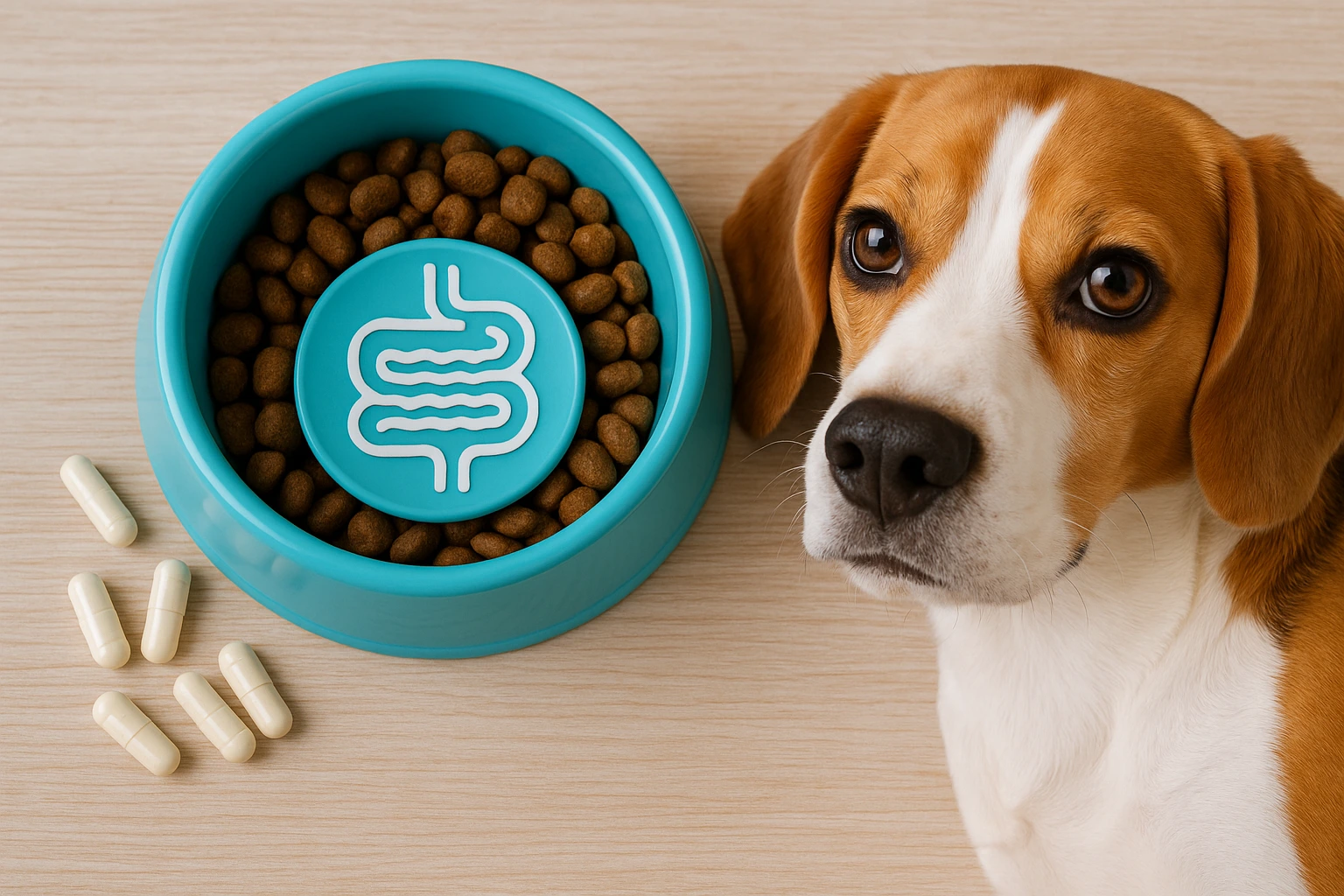Dog Probiotics for Gut Health: Benefits, Strains & Safety

A healthy gut means a happier dog.
New studies show that balancing the trillions of microbes inside your pup can calm anxiety, boost immunity, and even influence day-to-day personality traits like confidence and curiosity.
What Exactly Are Probiotics?
Probiotics are live, beneficial bacteria—most often Lactobacillus, Bifidobacterium, or friendly yeasts—that help maintain a stable intestinal ecosystem.
When stress, illness, or antibiotics wipe out good bugs, supplements can restore balance and reduce diarrhea, gas, and bad breath.
Five Signs Your Dog Might Need Gut Support
- Frequent soft stools or diarrhea after boarding or travel.
- Loud tummy gurgles, gas, or foul breath.
- Itchy skin or recurring ear infections—often linked to dysbiosis.
- Sudden mood swings or separation anxiety flare-ups.
- Low energy despite a balanced diet.
Five Proven Benefits of Canine Probiotics
1 Better Digestion and Stool Quality
Multiple trials report fewer loose stools and faster recovery from gastroenteritis when dogs receive Lactobacillus and Bifidobacterium blends.
2 Calmer Mind, Less Anxiety
The gut-brain axis is bidirectional. Specific strains cut stress hormones and reduce anxious behaviors in canines during thunderstorms and travel.
3 Stronger Immune System
Regular probiotic use increases fecal IgA and enhances the intestinal barrier, helping pups fight pathogens before they cause trouble.
4 Healthier Skin and Coat
Because 70 % of immune cells live in the gut, improving microbial balance can translate to fewer allergic flare-ups and shinier fur.
5 More Stable Energy and Appetite
By boosting nutrient absorption and cutting inflammation, probiotics often bring back missing pep in senior or post-illness dogs.
How to Choose the Right Supplement
| Factor | What to Look For |
|---|---|
| Strain Transparency | Named strains like L. plantarum DSM 9843 or B. animalis AHC7 have clinical data |
| CFU Count | At least 1-3 billion CFU per serving for maintenance; higher if recovering from antibiotics |
| Form & Storage | Freeze-dried powders stay stable longer than liquids; check for “room-stable” labels. |
| Third-Party Certification | NASC quality seal or ISO-accredited lab testing avoids inactive products. |
| Special Needs | Puppies and immune-compromised dogs need gentler, single-strain formulas—consult your vet first. |
The booming market—projected to hit US $437 million for dog products alone by 2031—means shelf space is crowded.
A clear checklist keeps you from wasting money on over-hyped powders.
Natural Food vs. Supplement
Unsweetened kefir, plain yogurt, and fermented goat milk offer small doses of live cultures plus calcium and protein.
Yet they rarely reach therapeutic CFU levels, so think of them as “maintenance snacks,” not medical fixes.
Using Probiotics Safely
Most dogs tolerate them well, but mild gas or loose stools can appear during the first week as microbes adjust.
Stop the product and call your vet if vomiting, lethargy, or bloody diarrhea emerges.
For dogs on immunosuppressive drugs, always seek veterinary clearance.
Knowing your dog's personality helps you choose the right format and dosing plan. Take the 🚀 Free Dog Personality Test , and we will send you a printable probiotic cheat-sheet tailored to your pup's type. Happy guts, happy life!
Related Guides
Feeding basics: How Much to Feed Your Dog
Food safety: Can Dogs Eat This? Safe & Toxic Foods
Gut-friendly toppers: 15 Dog Superfoods
FAQ
Q: Can puppies take probiotics?
A: Yes; choose puppy-specific formulas with single strains and lower CFU.
Q: Do probiotics replace antibiotics?
A: No, they complement therapy but cannot treat bacterial infections alone.
Q: How long till I see results?
A: Digestive improvements often show within seven days; anxiety relief may take three to four weeks.
Q: Should probiotics be refrigerated?
A: Only if the label says so; many newer freeze-dried powders are shelf-stable.